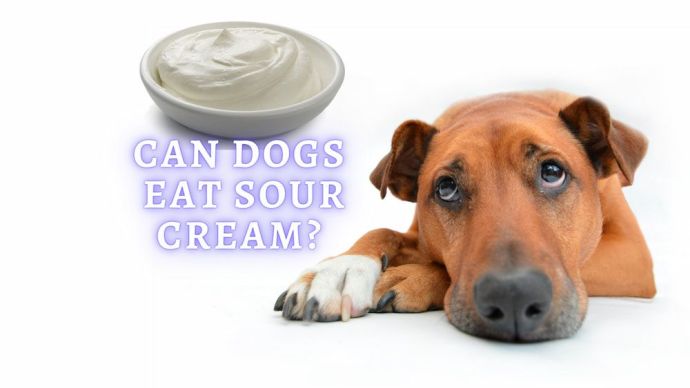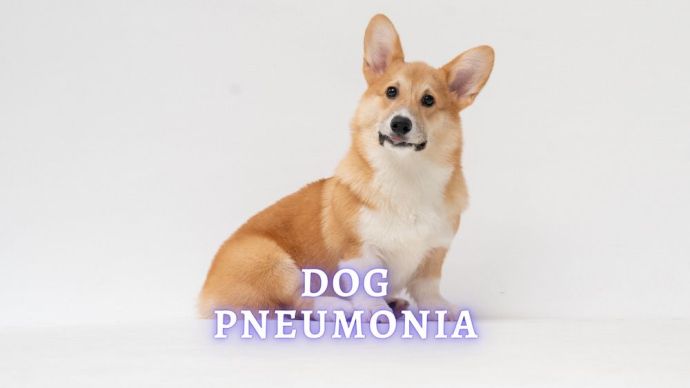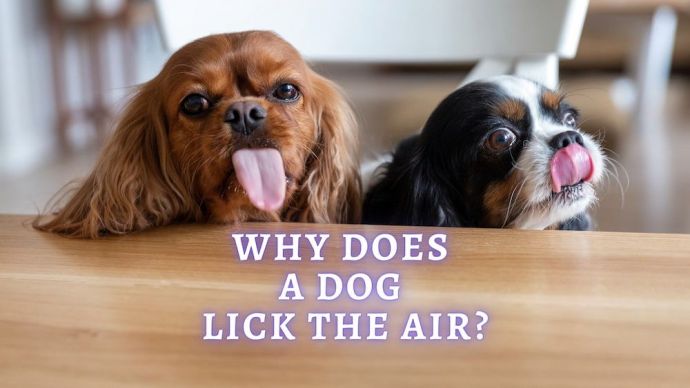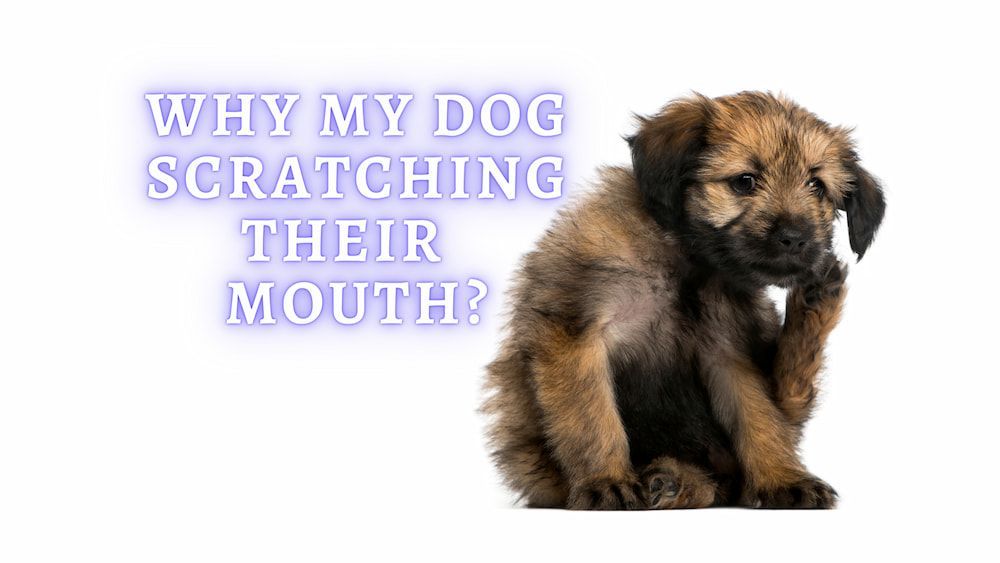My Dog Keeps Scratching His Mouth: Reasons Why Your Dog Scratching Face
Written by:
Author: Scott Jeffrey
Scott is a professional blogger with 12+ years of experience in writing, and holds an MA in anthropology. He has two cats as housemates. Also, Scott is passionate to research on pet-related topics such as dog training, puppy feeding, and cat health.
View all 63 articlesLearn about our editorial process and veterinary review board.
Viewed: 17560
Updated on: 04/11/2022
If you find that your dog is compulsively licking or scratching, there are many potential reasons that they could be affected. Suppose you notice that the problem is persisting. In that case, it is usually best to contact a veterinarian and make sure that you can curb some of this compulsive behavior wherever possible. A dog who will be itching or scratching more regularly is likely to scratching at their mouth to the point of bleeding or compulsively scratching at their mouth every few minutes. It is possible to adjust this behavior in your dog and make sure that they can experience more minor discomfort.
If you feel as though your dog is scratching excessively, you will need to make sure you contact a veterinarian immediately, and you can work to identify the main cause of the scratching.
Causes of Itching in the Muzzle area in Dogs
The muzzle area in most dogs can be a targeted site for itching. However, if your dog is regularly itching at their muzzle area, this can result from various irritations that dogs might experience. Here are some of the main reasons a dog may itch around heir muzzle area:
1. Indigestion
Indigestion can play a significant role in the itching that your dog might experience. If their stomach is feeling unwell or having problems with digestion, they may scratch at their mouth as a sign that they feel unwell. Many dogs have been observed during times that they felt sick to scratch at their faces to remove the irritant. Because your dog may not be able to take a medication to remove its indigestion, scratching at their face may be a way to show their signs of frustration and to refocus their minds into some other sensation beyond the indigestion feeling. If you notice your pet is regularly scratching after a mealtime, there is a good chance that you may need to change their food and try something different so they will experience fewer problems with digestion in the future. [3]
2. Skin Conditions
Many pets can experience skin conditions due to exposure to items in the environment, allergic reactions to food, heat rashes, medication reactions, and more. Skin conditions can be a vital thing to address with your veterinarian. If a skin condition is causing ongoing irritation for your pet, there is a good chance they could keep scratching and potentially cause wounds to open up over time. Rather than risking the chance that your pet will be overly itchy or develop a full-blown rash, it is a much better idea to consider making adjustments to your dog’s routine rather than have them continually suffer from a rash or other skin condition.
3. Infections
When skin conditions become severe, they can lead to infections. For example, if your pet has been scratching for some time and opened up a wound around the mouth, irritants and outside contaminants can make their way in and cause infections. Infections will lead irritation to get worse, and they can lead to some of the most severe reactions with your pet. Rather than risking an infection, removing the itching irritation from your pet early on will prevent the chance that you could see an ongoing infection present. An infection may also lead to the chance that your dog will have to go on antibiotics or take on a surgical intervention to manage the infected site. Again, early intervention is the best way to prevent the chance for infection and difficulty.
4. Trauma
Trauma can sometimes be a cause for scratching. Stress can be a big cause for dogs to scratch, and when a dog experiences trauma, there is a good chance that they can experience ongoing stress as a result of that trauma. Being good to your pet and making sure that they do not experience the ongoing anxiety of scratching or stress is important. If you notice your dog regularly scratching after an event such as another dog attacking them at a dog park, you are getting another pet or a near accident, there is a good chance they are experiencing stress as a result of trauma.
5. Dental Problems
If your dog has experienced problems with their oral care, there is a good chance they may also experience a need to regularly scratch at their face. Dental problems can be difficult to diagnose without a vet in pets until there is present swelling or some form of progressed infection. If you notice your dog is scratching at their face and there have been no changes in routine, dental issues could be the next reason a dog may scratch.
If you notice your dog scratching in one area and inspect their teeth, you may notice the signs of a dental problem. If you suspect a dental problem could be the reason for your dog scratching at the mouth, you need to get to a vet to diagnose and treat the problem before it gets worse. Regular brushing with your dog’s teeth or using treats that encourage them to self-clean their teeth can be very important to preventing this itching.
6. Irritants that contact the skin
Irritants that contact the skin can come from a wide range of environmental factors. For example, your dog might pick up irritants outside from flowers or plants, from fertilizers or pesticides, and more. You might also expose your dog to various irritations inside the home from cleaners or scents that they are sensitive to. If your dog’s skin comes in contact with these irritants, it might break out just like our skin would do. The pimples or rash that can be caused are common to present, and the mouth as many dogs will smell strange or unfamiliar items and get the irritant all over their muzzle. Dogs will continue to scratch so they can remove the irritant and then keep scratching as their rash spreads.
7. Allergies
Allergies can be caused by a variety of environmental hazards, or they can be caused by the food that you choose to feed your dog. If you change your dog’s food, there is a chance that they could react poorly to the change, and it may cause a series of itches or irritants in their body. Changing foods can mean you may trigger your dog with various food allergies to wheat or beef. If you are changing over the proteins, you feed your dog, making an overwhelming difference in their coat and skin.
Allergies in the environment can also create a big change for your pets as well. Allergies can regularly kick up just like they would in humans if your pets are exposed to things like ragweed or other environmental hazards. If you notice that your dog is itching at their skin during one season, there is a good chance they may have an allergy that a vet may be able to identify with you. An allergic reaction to medication can also occur in some cases if your pet is on some form of medication. Make sure that you are monitoring your pet as soon as they go on a new prescription and talk about the side effects with your vet as well.
READ MORE: Dogs Seasonal Allergies: Causes, Symptoms, Treatment, and Prevention
8. Anxiety/Boredom
Anxiety and boredom can be a big factor why a dog will scratch as well. If you leave your dog for hours a day without any outlet to focus on or any way to expel their energy, they might start to scratch at their face as a result of their anxiety and boredom. You might also notice your dog scratching their face often when they are in unfamiliar environments or presented with routine changes in their lives.
Maintaining routines if you have an especially stressful dog can be important if you find that your dog is overly bored. It is usually best to consider giving them toys, engaging with them often, and keeping them free of their feelings of boredom to prevent scratching. [1] [2]
READ MORE: Vet Guide to Healthy Dog Gums
How to help my Dog with Itching?
As soon as you notice the signs of a dog itching, it is usually best for you to contact your vet to get an appointment. Your vet will be able to help go through the various reasons your dog may itch and help you through the process of finding the best intervention. Usually, the best tool for handling a rash or major irritation will be in the form of systematic antibiotics or anti-itch creams that can target the main hot spots of the itch.
If you want to try and intervene with treatments you can try at home, using oatmeal paste or chamomile tea along the area can also be a helpful way to reduce the itching. Examine your routine for changes so that you can have a plan if the itching persists and so that you can speak to your vet about how the itching may have started too.
REA MORE: Best Dog Food for Skin Allergies
How to Prevent my Dogs from itching around the mouth?
Preventing your dog from itching around the mouth may require a vet visit as well. If you notice that your pet is regularly itching around the mouth, you can likely examine your routine to find the cause and contact a vet for anti-itch treatment if it is required. A vet may also recommend using a cone or barrier technique if there is an infection or severe rash. Using a cone with your dog for a few days can prevent them from reaching the area to scratch it with their leg until it heals. This is often a beneficial solution when your pet scratches the area to the point of infection.
FAQ:
Why does my Dog keep itching his Face?
Dogs may itch their faces due to anxiety, reactions due to allergies, boredom, changes in routine or dental issues. If you notice the signs of your dog’s itching, seek a veterinary intervention ASAP to prevent the chance that the area could become infected or that the irritation could grow worse.
How do I stop my Dog from scratching his Face?
There are some ways to stop your dog from scratching at their face if they are experiencing an irritation.
- Distraction: If your dog is scratching due to anxiety, it can be best to refocus their energy into a toy or to distract them when they start to scratch. Then, when they aren’t scratching and distracting them into something more positive, rewarding behavior will refocus the scratching energy into something that won’t harm them.
- Barrier: Using a barrier such as a cone can be an excellent solution for preventing the scratching behavior around the mouth. Many vets may recommend using a cone as a barrier to avoid the chance that your dog can scratch. A cone may be a difficult habit to continue, but it’s a fantastic way to curb the behavior and prevent your dog from scratching at the area over time. It is likely to be a temporary solution, but it’s a good item to keep hold of when the scratching returns.
Why does my Dog keep Scratching her snout?
Your dog might be scratching around their snout due to an allergy, irritation, boredom, and more. If you find that the behavior is growing more consistent, it may be wise for you to contact your veterinarian as soon as possible. Your dog scratching their snout can be a sign of more significant trouble with dental problems, so waiting to notice the behavior can be a significant risk.
Why does my Dog keep pawing his Face?
If your dog is pawing at its face regularly, this can be a sign that they are experiencing some kind of irritation. Sometimes the pawing can start as a way to remove the issue or as a means to handle boredom or anxious feelings. Early intervention will prevent a pawing or scratching at your dog’s face from persisting into something serious like an infection.
Consider some of these ideas and more if your pet is regularly scratching at their face. Keep in mind that early intervention can prevent serious problems with your pet down the road and help them red irritation.
Article Sources:
- Scholz, Martina, and Clarissa von Reinhardt. Stress In Dogs — Learn How Dogs Show Stress and What You Can Do to Help. amazon.com/Stress-Dogs-Learn-dogs-stress-ebook/dp/B077ZGD6NZ.
- Gibeault, Stephanie, et al. “Dealing With Puppy Separation Anxiety.” American Kennel Club, 10 Dec. 2019, akc.org/expert-advice/training/puppy-separation-anxiety/.
- Royal, Barbara, et al. “Understanding Pet Digestion.” IVC Journal, 12 June 2018, ivcjournal.com/understanding-pet-digestion/.
 Dog Care Can Dogs Eat Sour Cream? Benefits and Risks of Feeding Your Dog Sour Cream
Dog Care Can Dogs Eat Sour Cream? Benefits and Risks of Feeding Your Dog Sour Cream - 5864
- 0
 Dog Care Can Dogs Eat Olives? Benefits and Dangers of Feeding Olives to Your Dog
Dog Care Can Dogs Eat Olives? Benefits and Dangers of Feeding Olives to Your Dog - 167
- 0
 Dog Veterinary Tips Pneumonia in Dogs: Symptoms, Diagnosis, Treatment and Recovery (Vet Advice)
Dog Veterinary Tips Pneumonia in Dogs: Symptoms, Diagnosis, Treatment and Recovery (Vet Advice) - 478
- 0
 Dog Care Why Does My Dog Lick The Air? Health and Behavior Reasons for Dog Licking Air and How to Stop It
Dog Care Why Does My Dog Lick The Air? Health and Behavior Reasons for Dog Licking Air and How to Stop It - 143
- 0
 Dog Veterinary Tips Why is my Dog throwing up: Causes and Preventing (Veterinary Advice)
Dog Veterinary Tips Why is my Dog throwing up: Causes and Preventing (Veterinary Advice) - 23424
- 5
 Dog Care Why Is My Dog Bleeding From Its Butt? Causes and treatment of rectal bleeding in the dog
Dog Care Why Is My Dog Bleeding From Its Butt? Causes and treatment of rectal bleeding in the dog - 22075
- 0























